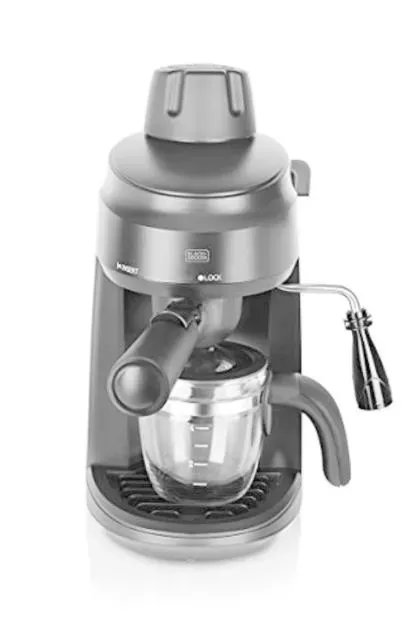Black plastic coffee makers have become a staple in many households; however, recent health warnings have raised serious concerns about their safety. These coffee machines often contain carcinogenic plastics and cancer-causing chemicals, primarily due to their reliance on materials like carbon black, which has been linked to significant health risks. Research has shown that black plastic, commonly used in kitchen appliances, may include harmful additives such as brominated flame retardants (BFRs) and organophosphate flame retardants (OPFRs). These substances can leach into your coffee over time, especially when exposed to high temperatures during brewing. Experts urge consumers to reconsider the safety of their coffee machines, as long-term exposure to such toxic chemicals can have dire health implications, including increasing the risk of various cancers and endocrine disruption.
In the quest for your daily caffeine fix, you might be unknowingly using coffee makers that could pose serious health risks. These appliances made from dark, industrial-grade plastics might contribute to the release of harmful substances during the brewing process. Concerns about toxic materials like carcinogenic plastics and chemical additives such as flame retardants are prompting experts to call for greater awareness about the safety of kitchen equipment. As you enjoy your morning brew, the risks associated with flame retardants and their potential effects on human health can no longer be overlooked. It’s time to explore safer alternatives and prioritize the health of ourselves and our loved ones.
The Risks of Black Plastic Coffee Makers
Black plastic coffee makers, often perceived as stylish and modern, come with hidden dangers that could jeopardize your health. Experts have raised alarms that these devices might introduce cancer-causing chemicals into your daily brews. The primary concern is the presence of carbon black, a dye used in the manufacturing process that has been linked to numerous health risks, including cancer. When the coffee maker is heated, especially over extended sessions, there’s a possibility that these carcinogens can leach into the coffee, posing serious health threats to regular users.
Moreover, the incorporation of flame retardants such as brominated flame retardants (BFRs) and organophosphate flame retardants (OPFRs) further compounds the problem. While these additives are intended to prevent electrical fires, they come with their own set of health risks. Studies have indicated a direct correlation between high levels of these flame retardants and increased cancer risk, as well as neurotoxic effects that can disrupt hormonal balance. This introduces a compelling argument for consumers to reconsider their choice of kitchen appliances.
Frequently Asked Questions
Are black plastic coffee makers safe to use due to cancer-causing chemicals?
Black plastic coffee makers can pose health risks due to the presence of cancer-causing chemicals such as carbon black and flame retardants like BFRs and OPFRs. Studies indicate that these materials can leach harmful substances into your coffee, especially when the machine is damaged or exposed to high temperatures.
What are the potential risks associated with black plastic coffee makers containing carcinogenic plastics?
The risks associated with black plastic coffee makers include exposure to carcinogenic plastics, which may release harmful chemicals like polycyclic aromatic hydrocarbons (PAHs) into beverages. Long-term exposure can lead to serious health issues including cancer and endocrine disruption.
How can I ensure the safety of my black plastic coffee maker regarding flame retardants?
To ensure the safety of your black plastic coffee maker, opt for machines free from brominated flame retardants (BFRs) and organophosphate flame retardants (OPFRs). Look for BPA-free options or those made from stainless steel or glass, which minimize exposure to these harmful chemicals.
What should I do if my black plastic coffee maker shows signs of damage?
If your black plastic coffee maker shows signs of damage, it is advisable to discontinue use. Damaged machines are more likely to leach cancer-causing chemicals into your coffee, particularly when exposed to boiling water.
Can cleaning methods affect the safety of black plastic coffee makers and their carcinogenic components?
Yes, cleaning methods can significantly impact the safety of black plastic coffee makers. Regular cleaning with filtered water, as well as avoiding harsh chemicals, can help reduce the buildup of harmful substances and minimize carcinogenic exposure.
What alternatives exist to black plastic coffee makers that may be safer?
Safer alternatives to black plastic coffee makers include those made from stainless steel or glass, which do not leach harmful chemicals. Additionally, look for brands that specifically state their products are free from carcinogenic plastics and toxic flame retardants.
How do I choose a safe coffee machine considering the risks of carcinogenic plastic?
When choosing a coffee machine, prioritize BPA-free, stainless steel, or glass options while avoiding black plastic coffee makers that may contain cancer-causing chemicals like carbon black and flame retardants. Always research brands and read product information clearly.
What is the connection between coffee machines and cancer risks according to research?
Research indicates that black plastic coffee machines can expose users to cancer risks due to carcinogenic components like carbon black and flame retardants, which can accumulate in the body over time and potentially lead to serious health issues.
What are the symptoms of exposure to harmful chemicals from black plastic coffee makers?
Symptoms of exposure to harmful chemicals from black plastic coffee makers may include hormonal imbalances, thyroid issues, inflammation, and long-term exposure could increase the risk of cancers such as breast and lung cancer.
What are the best practices to mitigate risks from using black plastic coffee makers?
To mitigate risks, prefer shorter and cooler brew cycles, regularly clean the machine, and use filtered water. Limit exposure by opting for coffee makers made from safer materials like stainless steel or glass.
| Key Point | Details |
|---|---|
| Health Risks | Black plastic coffee makers may contain cancer-causing chemicals like carbon black and toxic flame retardants such as BFRs and OPFRs. |
| Carcinogenic Materials | Carbon black is classified as a carcinogen and is used to achieve a uniform black color in plastics, containing harmful compounds. |
| Toxicity Studies | Studies have linked the accumulation of flame retardants in the body to cancer risks and endocrine disruption. |
| Children’s Health | Children are particularly vulnerable to these chemicals due to their developing organs and higher exposure levels. |
| Recommendations | Consider alternatives like stainless steel or glass coffee makers, and maintain cleanliness to reduce risks. |
Summary
Black plastic coffee makers may be more harmful than you think, as they can lead to increased exposure to carcinogenic chemicals. Studies have raised serious concerns regarding the health implications of using these coffee machines, suggesting that the harmful materials can leach into your coffee during the brewing process. To safeguard your health, it is advisable to consider using safer alternatives and stay informed about the potential risks associated with black plastic coffee makers.



